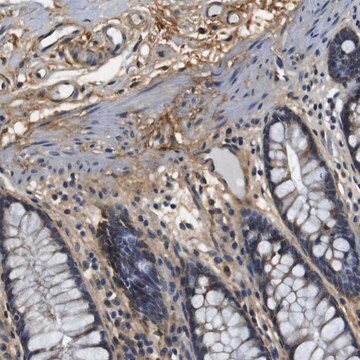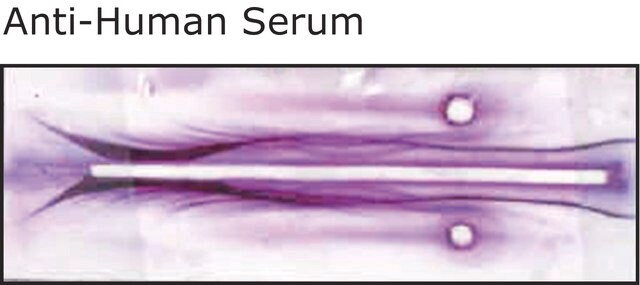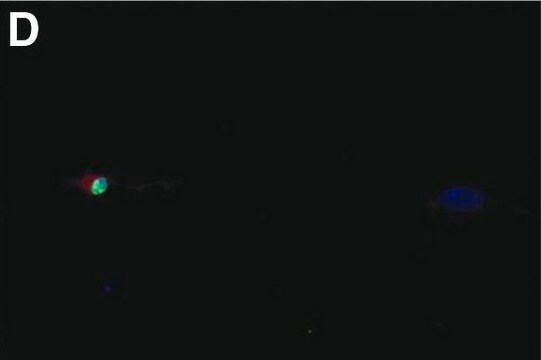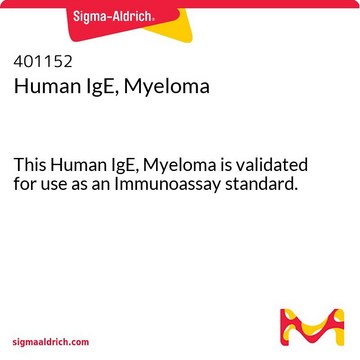推薦產品
生物源
rabbit
共軛
unconjugated
抗體表格
affinity isolated antibody
抗體產品種類
primary antibodies
無性繁殖
polyclonal
產品線
Prestige Antibodies® Powered by Atlas Antibodies
形狀
buffered aqueous glycerol solution
物種活性
human, mouse, rat
技術
immunoblotting: 0.04-0.4 μg/mL
immunofluorescence: 0.25-2 μg/mL
immunohistochemistry: 1:200-1:500
免疫原序列
FEELGKQIQQYMKIISSFKNKEDQYDHLDAADMTKVEKSTNEAMEWMNNKLNLQNKQSLTMDPVVKSKEIEAKIKELTSTCSPIISKPKPKVEPPKEEQKNAEQNGPVDG
UniProt登錄號
運輸包裝
wet ice
儲存溫度
−20°C
目標翻譯後修改
unmodified
基因資訊
human ... HSPA4(3308)
一般說明
HSPA4 (heat shock protein family A (Hsp70) member 4) is a chaperone protein with an activity similar to that of Hsp110, and thus, is considered to be a member of the hsp110 protein family. It is a cytoplasmic protein and is composed of a nucleotide-binding domain (NBD) and a peptide-binding domain (PBD) intervened by a flexible linker region. In adult mouse tissues, HSPA4 mRNA has a wide range of expression with the highest expression in spleen, ovary and testis.
免疫原
Heat shock 70 kDa protein 4 recombinant protein epitope signature tag (PrEST)
應用
Anti-HSPA4 antibody produced in rabbit, a Prestige Antibody, is developed and validated by the Human Protein Atlas (HPA) project . Each antibody is tested by immunohistochemistry against hundreds of normal and disease tissues. These images can be viewed on the Human Protein Atlas (HPA) site by clicking on the Image Gallery link. The antibodies are also tested using immunofluorescence and western blotting. To view these protocols and other useful information about Prestige Antibodies and the HPA, visit sigma.com/prestige.
生化/生理作用
HSPA4 (heat shock protein family A (Hsp70) member 4) is up-regulated in breast, ovarian, pancreatic and colon cancers. It plays an essential role in the migration, invasiveness and transformation of cancer cells. It is a candidate cancer stem cells (CSCs) marker for gastric cancer. This protein is induced in response to radioactive and acidic pH stress, and is up-regulated in HCC (hepatocellular carcinoma). This protein is up-regulated by NBS1 protein, which is elevated in the chromosomal-instability syndrome called Nijmegen breakage syndrome (NBS). This protein plays a critical role in normal spermatogenesis. The over-expression of HSPA4 is related with poor prognosis in HBV (hepatitis B virus)-associated early-stage HCC.
特點和優勢
Prestige Antibodies® are highly characterized and extensively validated antibodies with the added benefit of all available characterization data for each target being accessible via the Human Protein Atlas portal linked just below the product name at the top of this page. The uniqueness and low cross-reactivity of the Prestige Antibodies® to other proteins are due to a thorough selection of antigen regions, affinity purification, and stringent selection. Prestige antigen controls are available for every corresponding Prestige Antibody and can be found in the linkage section.
Every Prestige Antibody is tested in the following ways:
Every Prestige Antibody is tested in the following ways:
- IHC tissue array of 44 normal human tissues and 20 of the most common cancer type tissues.
- Protein array of 364 human recombinant protein fragments.
聯結
Corresponding Antigen APREST71595
外觀
Solution in phosphate-buffered saline, pH 7.2, containing 40% glycerol and 0.02% sodium azide
法律資訊
Prestige Antibodies is a registered trademark of Merck KGaA, Darmstadt, Germany
免責聲明
Unless otherwise stated in our catalog or other company documentation accompanying the product(s), our products are intended for research use only and are not to be used for any other purpose, which includes but is not limited to, unauthorized commercial uses, in vitro diagnostic uses, ex vivo or in vivo therapeutic uses or any type of consumption or application to humans or animals.
未找到適合的產品?
試用我們的產品選擇工具.
儲存類別代碼
10 - Combustible liquids
水污染物質分類(WGK)
WGK 1
閃點(°F)
Not applicable
閃點(°C)
Not applicable
個人防護裝備
Eyeshields, Gloves, multi-purpose combination respirator cartridge (US)
分析證明 (COA)
輸入產品批次/批號來搜索 分析證明 (COA)。在產品’s標籤上找到批次和批號,寫有 ‘Lot’或‘Batch’.。
Mauricio Krause et al.
Clinical science (London, England : 1979), 128(11), 789-803 (2015-04-18)
The 70 kDa heat-shock protein (HSP70) family is important for a dynamic range of cellular processes that include protection against cell stress, modulation of cell signalling, gene expression, protein synthesis, protein folding and inflammation. Within this family, the inducible 72 kDa and
R Roufayel et al.
Cell death & disease, 5, e1546-e1546 (2014-11-28)
Protein-damaging stress stimulates cell destruction through apoptosis; however, non-lethal proteotoxic stress induces an adaptive response leading to the increased synthesis of heat shock proteins, which inhibit apoptosis. In this study, we sought to determine the mechanism responsible for the accumulation
Stefan Tukaj
Postepy higieny i medycyny doswiadczalnej (Online), 68, 722-727 (2014-06-18)
Heat shock proteins 70 (Hsp70) play an important role in maintaining cellular homeostasis. As molecular chaperones, Hsp70 are responsible for proper folding of newly synthesized polypeptides and refolding of misfolded and aggregated proteins. Hsp70 are involved in cellular transport and
Won Suk Yang et al.
Journal of proteome research, 11(2), 1078-1088 (2011-11-15)
Although doxorubicin (Doxo) and docetaxel (Docet) in combination are widely used in treatment regimens for a broad spectrum of breast cancer patients, a major obstacle has emerged in that some patients are intrinsically resistant to these chemotherapeutics. Our study aimed
Torsten Held et al.
Reproduction (Cambridge, England), 142(1), 133-144 (2011-04-14)
Heat-shock protein 110 (HSP110) family members act as nucleotide exchange factors (NEF) of mammalian and yeast HSP70 chaperones during the ATP hydrolysis cycle. In this study, we describe the expression pattern of murine HSPA4, a member of the HSP110 family
我們的科學家團隊在所有研究領域都有豐富的經驗,包括生命科學、材料科學、化學合成、色譜、分析等.
聯絡技術服務






